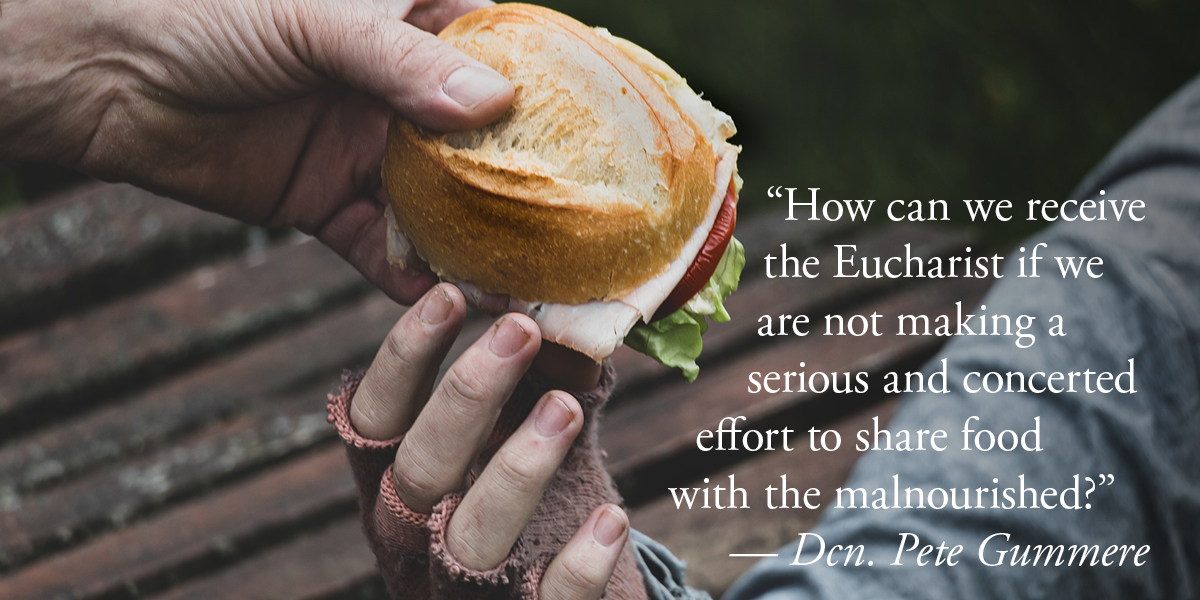
Food challenges
There is a great divide in this world relating to food. Some people are undernourished or even starving while others have more than they need and actually waste food.
The World Food Program of the United Nations reports that in a world with combined wealth of $400 trillion there are about 9 million people who die in a year from starvation and malnutrition-related disease. At the other end of spectrum, the U.S. Department of Agriculture estimates that some 30 to 40 percent of the U.S. food supply is wasted.
Yet unequal distribution of food, even in the U.S., is a definite problem. At the same time, we are confronting obesity as a highly significant problem in the US. Some 40 percent of us are considered obese, according to the Chan School of Public Health at Harvard University. Many people in this country lack a healthy, well-balanced diet, and hence consume too much high- calorie food to stave off feeling hungry.
I do not view this as a problem experienced by others. For many years I simply minimized my own obesity, insisting lightheartedly that I was a “recovering fat man” without engaging the problem seriously. Admittedly, I had some episodes of intentionally losing weight, only to be followed by subsequent weight gain. My doctors had repeatedly cautioned me about my weight.
Three years ago, I received a diagnosis that finally sank-in. I have type 2 diabetes! No more minimization or denial! My blood sugar and weight were out of control. Then began a year-long journey to lose a very significant percentage of my body weight.
My local hospital sponsored an educational program that made a true difference. Weekly Zoom meetings dealt with the combination of diet and exercise. About two months went by, and I had shed about 10 pounds. Over time that grew to a loss of 20 pounds; about a year from the diagnosis, that became 40 pounds.
Then finally I had lost 50 pounds about a year out from the initial diagnosis. Except for normal fluctuation in weight (up or down a few pounds) my weight has remained stable for a full two years.
Success did not come easily. It required discipline: an exercise regimen, counting calories and portion control. I altered my behavior and formed new habits.
Looking more broadly at our society, is it possible to alter our behaviors around food and diet? Individually, yes. On a societal level, yes! The total consumption and waste of food could be altered. This reduction in consumption and food waste would translate into availability of food for others in our society and elsewhere, in addition to the health and economic benefits to individuals and households.
There are obvious and mammoth educational, behavioral, and logistical challenges to achieving this. I suggest Catholics are uniquely positioned to lead the way. And I suggest that the law of charity and our Catholic faith requires that we do so.
Recall that the law of charity is central to the Gospel. We cannot allow Lazarus to starve at the gate of our home. Recall the manna in the desert. Recall how Jesus fed the multitudes in the desert.
Recall also that the outward sign of Eucharist we proclaim and receive at Mass, is food. How can we receive the Eucharist if we are not making a serious and concerted effort to share food with the malnourished?
Catholic Charities agencies throughout the country and other Catholic agencies (e.g., Catholic Relief Services) are already addressing these problems of hunger, yet the suffering persists. Admittedly, many if not most churches in Vermont support a local food shelf or operate one. Yet, both hunger and food waste remain widespread phenomena.
The problem of worldwide hunger is beyond the ability of humans to solve. Yet, it is not beyond the ability of the all-powerful God to intervene. Afterall, He provided food for the multitudes in the Gospels and manna in the desert.
Isn’t it time to reinvigorate these efforts with a new surge of prayer for God to act, coupled with our best human efforts to persist and expand?
Doing nothing is simply not an option! At least inaction is not a moral option.
—Deacon Pete Gummere is director of the permanent diaconate and serves at Corpus Christi Parish based in St. Johnsbury.
—Originally published in the Summer 2023 issue of Vermont Catholic magazine.

